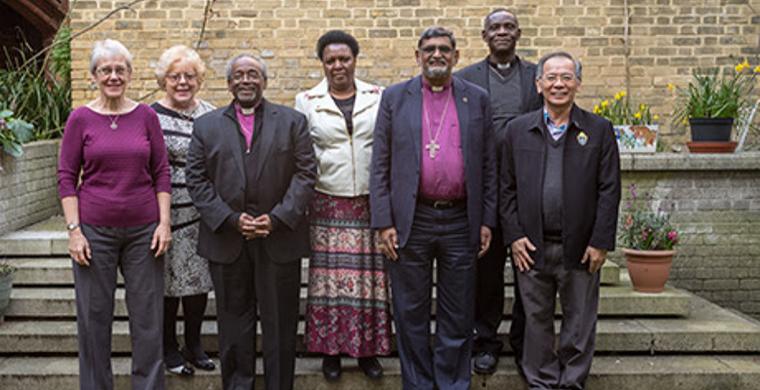Maintaining conversation across the Anglican Communion. Is it possible now?
By David W. Virtue, DD
www.virtueonline.org
March 27, 2018
A task force that was formed by the Archbishop of Canterbury in 2016 to maintain conversation and to restore relationships, rebuild mutual trust, heal the legacy of hurt and explore deep differences across the fractured Communion has announced plans for a Season of Repentance and Prayer next year.
So, what exactly will they repent of and pray for? That's the question. Of the ten archbishops and other leaders (see list below) participating in this event, about half are orthodox in faith and morals and half are not. Those who are definitely not orthodox, (some of whom hedge their bets just in case they might be wrong) are: Richard Clarke, Archbishop of Armagh and Primate Church of Ireland; Michael Curry, Presiding Bishop and Primate of the (US-based) Episcopal Church; Elizabeth Paver, Former vice-chair of the Anglican Consultative Council Church of England, Linda Nicholls, Bishop of Huron Anglican Church of Canada and Josiah Idowu-Fearon, Secretary General of the Anglican Communion.
'Deep differences' is circumlocution for we can't agree, but let's stay together rather than split the communion over homosexuality and gay marriage. But don't expect God to answer a prayer for which we already know the answer, too. Scripture is abundantly clear that sex is only between a man and woman in marriage. No exceptions. You can pray till you are blue in the face, but God has not and is not going to change His mind even if you have changed yours. Does repentance mean that western Anglican pansexualists will now admit that sodomy is a sin, that "gay" marriage is not real marriage at all? That is not going to happen if Michael Curry is on board.
Bishop Ian Ernest of the Indian Ocean, who has been chairing this week's meeting, said the season would be the Communion's gift to a world in pain.
Plenty of pain to go around for sure, but in the case of The Anglican Communion the pain has been self-inflicted and continues, because a handful of homosexuals and lesbians want the Church to change its mind about (homo)sex so they can feel incorporated without the need for change...in the name of justice of course.
"We are aware of difficulties and hurts," he said. "The world knows brokenness. The Anglican Communion has had its struggles and its brokenness too. So this is our response: our belief that prayer will help us to grow and to love in spite of differences. Our belief is that our differences don't need to lead to hate but prayer can lead us to heal where relationships have been impaired. We know that we are called to be instruments of love and forgiveness, of righteousness and truth."
'Differences' never led to hate, that is part of the nomenclature of spin by homosexual activists in the communion.
Why is it then that GAFCON archbishops and bishops led by Nigerian Primate Nicholas Okoh will have nothing to do with this "prayer meeting." The church is "broken" because the pansexualists tore the fabric of the communion two decades ago and it has not been repaired and won't be, because the other side refuses to repent of sexual sin.
Bishop Ian said the group was now working on concrete actions which reflected its mandate to help the Communion to "walk together" in spite of differences. He said he hoped the season of prayer would also help build momentum towards the Lambeth Conference in 2020.
What "concrete actions" is Bishop Ian talking about, we would love to know. The communion hasn't "walked together" since Lambeth 1998 when Resolution 1:10 was struck and still stands as a watershed resolution. Does "walking together" include inviting ACNA Archbishop Foley Beach to Lambeth 2020? I think not.
The group said its prayer for the Communion has been and would continue to be an echo of Christ's prayer that "they may all be one . . . that the world may believe", and the group's unity, life and witness would "strive to be within Christ's will".
This is a misuse of John 17:21. It is clear from an examination of this Scripture that the oneness prayed for by the Savior predated the existence of denominationalism. In short, you cannot unite something already united. The text implies that we are already united by Christ into His body and therefore should remain in it and we cannot be separate from it. Organic unity follows spiritual unity. Such unity did exist in the apostolic ages before there were any sects; it has not existed since the apostasy and will not be restored until God's people all stand together as one body, having one spirit, one Lord, one faith, one baptism, one calling, one hope, one Father. A second observation that must be made: Jesus' prayer has not yet been answered fully. We live in the interim period before the consummation of all the promises of God. We are justified and at the same time sinful (simul justus et peccator), as Luther rightly said. Since we are still sinful, we don't love each other the way we should.
This prayerfest will resolve nothing until representatives of all the provinces are on board, especially and including those members provinces in GAFCON, and there is no indication they will.
Members of the group are:
Richard Clarke, Archbishop of Armagh and Primate Church of Ireland
Michael Curry. Presiding Bishop and Primate of the (US-based) Episcopal Church
Ian Ernest, Bishop of Mauritus Province of the Indian Ocean
Philip Freier, Archbishop of Melbourne and Primate Anglican Church of Australia
Moon Hing. Bishop of West Malaysia and Primate Province of South East Asia
Elizabeth Paver, Former vice-chair of the Anglican Consultative Council Church of England
Rosemary Mbogo, Provincial Secretary Anglican Church of Kenya
Linda Nicholls, Bishop of Huron Anglican Church of Canada
Paul Sarker, Bishop of Dhaka and Primate Church of Bangladesh
Josiah Idowu-Fearon, Secretary General of the Anglican Communion
END














